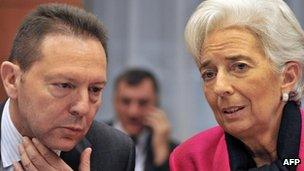Greece bailout extension 'to cost 32bn euros more'
- Published

A draft document prepared for eurozone finance ministers suggests that Greece should be given two more years to meet budget goals, but that this will add 32.6bn euros ($41.4bn) to its bailout.
Eurozone finance ministers have met in Brussels to discuss new targets for Greece based on the report.
The ministers also delayed a decision on whether to release the latest 31.5bn euro tranche of bailout funds.
They said they would meet again to discuss the issue on 20 November.
Greece has been pushing for the funds after passing a tough budget for 2013 on Sunday.
Greek PM Antonis Samaras has warned that without the new tranche the country will run out of money within days.
But the eurozone ministers said Greece needed to implement a "few remaining" prior actions to allow the process to move forward.
'Smoother path'
The draft document on the pace of Greek economic reform was prepared by the so-called "troika" - the International Monetary Fund, the European Central Bank and the European Commission.
The troika has already pledged 240bn euros in bailout loans to Greece.
The two-year extension would give Greece time to achieve a primary budget surplus - a figure that would not include debt-financing costs.
The document says: "Our revised fiscal programme targets the 4.5% of GDP primary surplus target by 2016, two years later than foreseen.
It adds: "The smoother path will help to moderate the impact of fiscal adjustment on the economy."
The extension would cost an additional 32.6bn euros and comes with "very large" risks, the report says.
Those risks include the uncertain political support for the programme within Greece, the possible negative effect on the economy of the fiscal consolidation and possible court challenges to the measures.
The BBC's Chris Morris in Brussels says the original intention was for debt to be reduced to 120% of GDP by 2020 but that this is no longer feasible and a new target needs to be agreed by everyone.
He says this means more uncertainty, at a time when many Greek citizens believe they have taken all the austerity they can swallow.
Market fund-raising
Eurogroup chief Jean-Claude Juncker had earlier expressed optimism about the troika report.
"The basis is positive, because the Greeks have really delivered," he said.
Greek MPs approved the 2013 budget, which includes further cuts to pensions and wages, in a vote on Sunday night.
More than 10,000 people joined demonstrations outside Greece's parliament to protest against the cuts.
The passing of the budget was a pre-condition for Athens to be granted the next tranche of 31.5bn euros of EU/IMF loans necessary to stave off bankruptcy.
Greece faces a repayment deadline for 5bn euros of debt on Friday.
However, eurozone ministers had indicated it was unlikely a decision on the disbursement of the tranche would be made at Monday's meeting.
The funding will have to be approved first by some national parliaments, including Germany's.
"We all... want to help Greece, but we won't be put under pressure," German Finance Minister Wolfgang Schaeuble told the weekly newspaper Welt am Sonntag.
On Tuesday, Greece will make an urgent bid to raise funds from the financial markets in case it does not get the tranche of bailout money.
The national economy is expected to shrink next year by 4.5% and public debt is likely to rise to 189% of GDP, almost double Greece's national output.
This year, public debt stood at 175%.
The head of Syriza, a left-wing opposition party, said the budget cuts would leave Greeks unable to afford essential goods this winter.